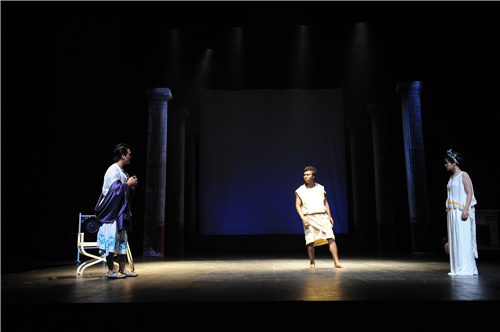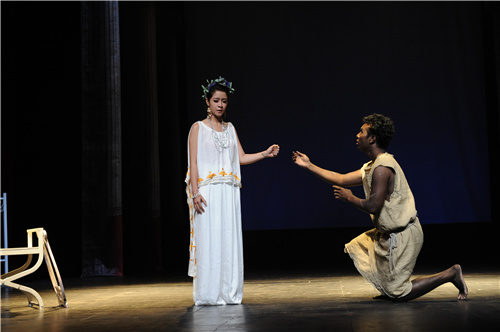
Director: Hoang Su
Playwright: G. Fighereido
Institution: Hanoi Academy of Theatre and Cinema, Vietnam
Venue: North Theatre
Time: 10:00~12:00, May 21, 2010
Event: ATEC 5th International Forum with the 1st Asian Theatre Schools Festival

Director’s Notes
Naturally, first of all, this is the echo resounding from the content and concept of G Figueiredo’s work; he is a playwright coming from a country beyond the distance hemisphere, who has not been known by most Vietnamese; however, it is familiar to us because of the conception of Freedom for the people in this masterpiece. The fox and the grapes is the drama about freedom’s honour; it claims people for the principles of preserving their value and status in society.
Let Aesop free means liberating people from the binding of body and soul. Please, return people the witted intelligence of the folk!
It is the sovereign purpose of the drama determined by us.
The G Figueiredo’s work was written with the style mixed between plain folk (the fables) and the deep philosophy (about the concept of Freedom and inevitability).
It considers our biggest challenge for the limit of ability to reach the high art of the drama. However, we still keep the wish and hope to perform the drama at the high artistic level. Especially when we work with the type of drama where speech act considered the main mean of transferring. In addition, performing with antique Greek costumes seems to be our eagerness when we carry out this drama.

Synopsis
Aesop is a fable teller in ancient Greece. Taking the inspiration from the folk poet who incarnated as a Black slave with the name Aesop; and according to the stories telling by him, G. Figueiredo - a Brazilian playwright has written a drama masterpiece in Spanish is: “A Rapsoa e as Uvas”.
This drama contains 3 acts. Besides the implication of dramatic situations in the fables told by Aesop, the audiences are able to realise the drama development:
When a Greek Philosopher - Xantuyt bought slaves, they offered him one more black slave who was ugly but very intelligent, and especially, he could tell many interesting fables. His name is Aesop. The appearance of Aesop in Santist’s house made many problems: Klea - Xantuyt’ s wife fell in love with Aesop because he possessed the supernatural intelligence and the beauty of hardened but strong appearance. Owing to not being requited, Klea asked her husband to revenge Aesop with rod. However, this did not happen, Aesop by his supernatural intelligence had rescued his master from a trick that Xantuyt could have lost all his treasure and slaves, because he had challenged Aganotos - the Chief imperial guard drinking all the sea water!
Under any circumstances, in every dangerous situations, Aesop always wants to claim for freedom: he asked for the freedom after each fable he told the master and made him pleasant; asked for the liberty, he becames free after rescued his master from the debt; demanded for freedom after finding his master’s wife when she went away; claimed for the freedom even when beautiful woman attracted or charmed and asked for the freedom even when the death was close to him! Eventually, his desperate desire of Freedom requited deservedly: His master - Xantuyt signed in the paper and let Aesop free.
Nevertheless, the word Freedom which Aesop desired hoped was the pure and sweet freedom as the ripe grape. Therefore, the last event when Aesop was arrested again when he was suspected to steal the golden cup in the shrine, but it was implemented by Klea because she very loved him; she hoped this was a chance to keep him beside her; however, this urged him to reach to the sky to find Freedom! Freedom! Freedom! The sweet word...

